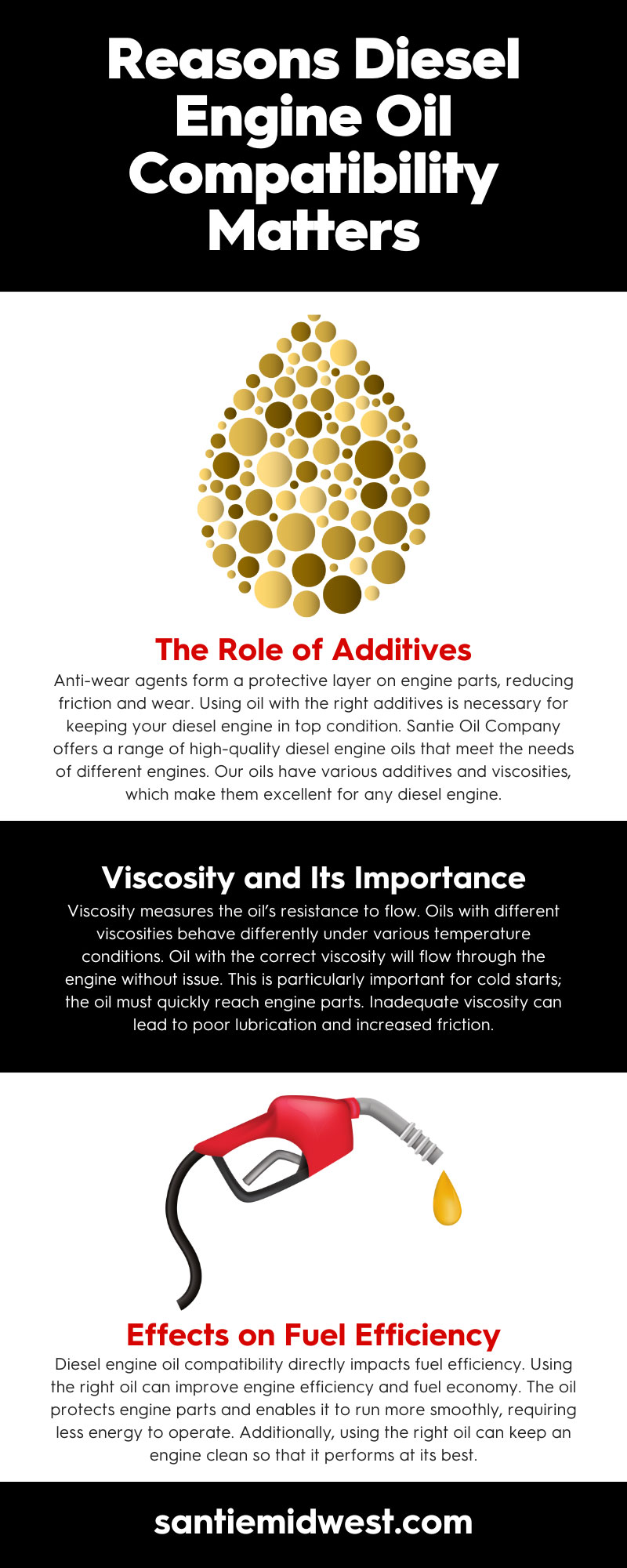Keeping your diesel engine running smoothly involves more than performing periodic maintenance. Engine oil compatibility is important for anyone looking to optimize their diesel engine’s performance and longevity. Whether you are a professional mechanic or a diesel vehicle owner, understanding the reasons why diesel engine oil compatibility matters can save you a lot of trouble.
What Is Diesel Engine Oil Compatibility?
Diesel engine oil compatibility refers to how well a type of oil meets the needs of your engine. Compatibility is necessary because diesel engines have unique requirements that differ from gasoline engines. Using the right oil ensures the engine runs efficiently. Engine oils have different additives and viscosities that affect engine performance, so choosing the wrong oil can lead to subpar performance and even engine damage.
1. The Role of Additives
Pay attention to the additives in diesel engine oil because they support optimal engine performance. These additives help by cleaning, protecting, and enhancing the engine’s efficiency. Antioxidants, detergents, and anti-wear agents are some common additives. Antioxidants prevent oil degradation, while detergents clean the engine.
Anti-wear agents form a protective layer on engine parts, reducing friction and wear. Using oil with the right additives is necessary for keeping your diesel engine in top condition. Santie Oil Company offers a range of high-quality diesel engine oils that meet the needs of different engines. Our oils have various additives and viscosities, which make them excellent for any diesel engine.
2. Viscosity and Its Importance
Viscosity measures the oil’s resistance to flow. Oils with different viscosities behave differently under various temperature conditions. Oil with the correct viscosity will flow through the engine without issue. This is particularly important for cold starts; the oil must quickly reach engine parts. Inadequate viscosity can lead to poor lubrication and increased friction.
3. Effects on Fuel Efficiency
Diesel engine oil compatibility directly impacts fuel efficiency. Using the right oil can improve engine efficiency and fuel economy. The oil protects engine parts and enables it to run more smoothly, requiring less energy to operate. Additionally, using the right oil can keep an engine clean so that it performs at its best.
Using the wrong oil in your diesel engine can result in poor combustion and increased fuel consumption. This can add up over time and become quite expensive. Selecting compatible engine oil is not just about engine health but also about saving money on fuel!
4. Impact on Engine Longevity
Another reason diesel engine oil compatibility matters is because lubrication affects engine longevity. Compatible oil keeps wear to a minimum, so the engine will last long.
Regularly using the wrong oil can lead to excessive wear, costly repairs, or even the need for a complete engine replacement. Using a suitable lubricant is an investment in your engine’s future.
5. Environmental Considerations
Using the right diesel engine oil has environmental benefits, as well. Compatible oil supports efficient combustion and reduces harmful emissions. Over time, this can lower your vehicle’s environmental footprint.
In addition, using compatible oil minimizes waste. When you use the right oil for your diesel engine, you could reduce the frequency of oil changes. That means there’s a smaller chance of improper oil disposal.
6. Manufacturer Recommendations
Always follow the manufacturer’s recommendations for using diesel engine oil. Manufacturers base their guidelines on extensive testing, and they design the lubricants to optimize engine performance. Ignoring these recommendations can lead to subpar performance of the lubricant.
Manufacturer guidelines provide information on the best type of oil for your engine model. Adhering to these guidelines will help you use the most compatible oil for your engine.
7. Importance of Regular Oil Changes
Over time, oil degrades and loses its effectiveness. Regularly changing the oil means your engine always has fresh oil. This also helps with maintaining optimal performance and reducing wear.
Skipping or procrastinating oil changes can lead to sludge buildup in the engine. Stick to a regular schedule for oil changes. Luckily, they are not complicated, and you can do them without professional assistance.
The steps include draining the current oil, replacing the oil filter, and adding new oil of the correct type and viscosity. Your vehicle may have additional requirements for oil changes, so refer to your vehicle’s manual for specific instructions. Finally, you must dispose of the used oil in an environmentally friendly manner by taking it to a recycling facility.
8. The Risk of Mixing Oils
Mixing different types of diesel engine oils can lead to compatibility issues. Oils have different additives and viscosities, and mixing them can cause chemical reactions that degrade the oil’s quality in several ways.
First, the additives may lose their effectiveness during the chemical reaction. This can lead to reduced protection and cleaning capabilities. Additionally, the mixture of different viscosities can alter the oil’s flow characteristics, which makes it less effective at lubricating engine parts.
These effects can result in increased wear and tear on the engine, which could cause damage over time. Always stick to one type of oil to maintain compatibility. If you need to change oil types, flush the engine to minimize the risk of compatibility issues.
Common Myths About Diesel Engine Oil
Several myths surround diesel engine oil compatibility. One common myth is that all oils are the same, but as you know, oils have different additives, viscosities, and performance capabilities.
Another myth is that you can use any oil if it’s labeled for diesel engines. This myth can lead people to use inadequate oil, which may result in poor engine performance and damage. It’s important to rely on factual information and manufacturer recommendations when choosing oil.
Using the right diesel engine oil is necessary for maintaining engine health, improving fuel efficiency, and ensuring longevity. When you give it quality oil, your engine will run smoothly, saving you money on repairs and reducing your vehicle’s environmental impact.
Choose high-quality oils from Santie Oil Company. With over 70 years of experience and a wide selection of oils, we can help you find the right product for your needs!



